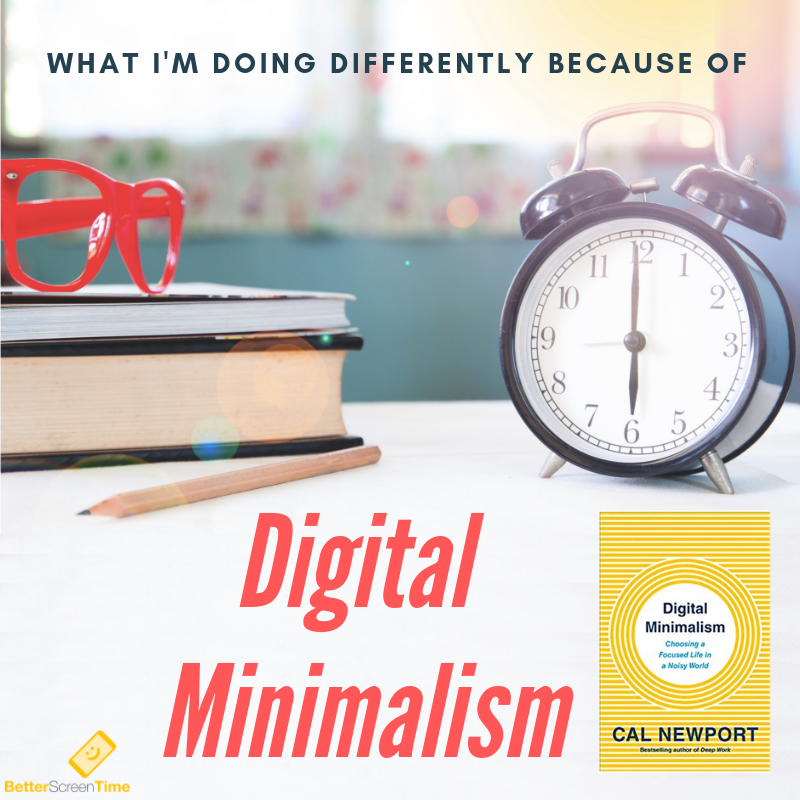
Cal Newport is well known for his research on the topic of focused, meaningful work.
But after reading his book Deep Work, readers wanted to know how to create that kind of focus in their personal lives. How can we use technology and still live a focused life?
In Digital Minimalism, Newport shares the experiences of everyday people who participated in a digital decluttering journey. Their real life stories, coupled with historical examples and research, will inspire you to reconsider your own relationship with technology.
Cal Newport is a computer science professor. He isn’t anti-tech; his goal is to help readers “to take control of our own digital lives—to confidently decide for ourselves what tools we want to use, for what reasons, and under what conditions.” This is the exact idea I’ve been pursuing personally for over a year.
Researching the effects of screens on our relationships, our families, how we use our time, our mental health—and more—made me realize I wanted to do better. Because I want to teach my kids how to use tech responsibly, I need to model this for them.
Over the past year, this is what I’ve changed:
- We removed devices from bedrooms and bathrooms in our home with two exceptions: my husband still uses his phone as an alarm clock that is plugged in right before bed. (He is the alarm clock in our home! When needed, I use an old-fashioned alarm clock.) Every once in awhile, we watch a movie together on a laptop in our room.
- I took a ten-day break from social media. I deleted all social media apps off of my phone. This is the longest break I’ve taken for a few years.
- I returned to an old habit of taking a book with me everywhere I went. I started leaving one in the car to read if I ever had downtime while waiting in the carpool lane or picking up kids from lessons.
- I started using the Screen Time function on my iPhone to shut down all unnecessary applications from 9 p.m. – 7 a.m. This gives me time to unwind, read, and talk to my teenager and spouse.
- I keep my phone in a family charging station when at home—not my pocket.
- I decided I would not treat texts as an emergency. I try to respond in a timely manner, but I committed to putting my own goals and tasks first in line. Close friends and family know they can always call me if there truly is an emergency.
The results of my experimenting:
- Better sleep.
- More conversation and connection in my marriage.
- My bedroom became a sanctuary once again.
- More engaged with the work in front of me.
- More time to read! I read books that inspired me, books that entertained me, and many books that taught me new ideas and solutions.
- More solitude. Newport talks about a new trend called solitude deprivation. He defines it as, “A state in which you spend close to zero time alone with your own thoughts and free from input from other minds.” Solitude isn’t always about being completely alone; it’s about having time with our thoughts, which is essential for our mental health. Newport writes, “Simply put, humans are not wired to be constantly wired.” I believe this! As I set aside time to be alone with my thoughts without a device nearby, I was able to process my thoughts and come up with new ideas.
- More focused on my kids. The bedtime routine has returned to what it used to be when my older kids were little. I’m mentally present for every sentence of Harry Potter because there is no buzz in my pocket.
Reading Digital Minimalism has provided even more incentive to continue experimenting!
New ideas I plan to tackle after reading Digital Minimalism:
- Planning a sabbatical away from social media over the summer. I’m still deciding when and for how long.
- I just ordered a watch! (And it’s not a smart watch.) I’m really stepping back in time. I don’t like the distraction of looking at my phone every time I need to know what time it is.
- Make a list of things I love to do or need to do, that I claim I never have time for. Then block time off on my calendar for those specific tasks, turn off and put away my devices for hours during this scheduled time.
- Start taking long walks. I go to barre class a few times a week, which I love. I also periodically hike or participate in other outdoor activities, but I think I would benefit from taking at least one long walk during the week to be alone with my thoughts. My challenge to myself is to put my phone in Do Not Disturb mode while I walk. (I like to take my phone along for personal safety reasons.)
More of Newport’s suggestions to help you become a digital minimalist:
- Don’t click “like” or “love” social media posts.
- Turn your devices into single-purpose computers.
- Dumb down your smartphone.
- Delete social media from your phone. (Newport recommends we quit accessing these services on the go as we are more likely to keep scrolling and clicking.)
Is there anything you’re thinking of trying? Once a new approach works for you, you can enjoy the confidence that comes with knowing what digital tools serve you best, why they serve you best, and when you want to use them.
In his book, Newport shares the steps for his digital declutter process, so you can discover which ideas will work best for you and your situation. If you’re truly interested in making your screen time better, I highly recommend you check out his process!
*As an Amazon affiliate I earn from qualifying purchases.

